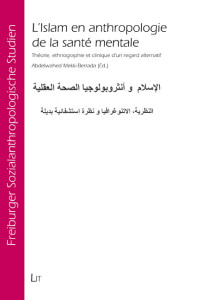Islam and mental health – Islam et santé mentale
Islam and mental health. Book review of: L’Islam en anthropologie de la santé mentale. Théorie, ethnographie et clinique d’un regard alternatif. Abdelwahed Mekki-Berrada (Ed.) Freiburger Sozialanthropologische Studien. Berlin : Lit Verlag, 2010. (200 blz.) ISBN 978-3-643-80052-7 Appeared in 2011 in: Medische Antropologie / Medical Anthropology. 23 ( 2 ).
This publication represents an investigation of the connections between Islam, transcultural psychiatry and the anthropology of mental health. As Western psychiatry is more and more confronted with patients and families with a Muslim background, this is a very important subject, politically, socially as well as clinically. In targeting this subject, it fills a gap in the current transcultural and intercultural literature.
The book addresses practical as well as fundamental questions. What is mental health, what are the underlying assumptions to this question and what are the practices concerned? Islam and Western psychiatry are both subject to these questions as they both hermeneutically interpret signs that are supposed to manifest reality. Migration, immigration, and globalization are rapidly changing world and reality. On a very practical level this means that more and more people have to deal with mixed heritage and belonging, an important part of which might be balancing Western values with Muslim ones.
The authors and the subjects covered are spread over study centers and continents. Canada: Universities of Ottawa, Montreal, and McGill; United States: University of Connecticut and its School of Medicine; France, Paris: Centre Georges Devereux, Bobigny: Avicenne, religiosity in urban poor India, and child caring practices and psychiatry in the Maghreb, (Muslim) North Africa (Morocco).
Abdelwahed Mekki-Berrada, also the editor, is Professor of medical anthropology in Canada and the US and involved in research in Canada, India, and Africa. He opens with a preliminary discussion considering the possibilities of medical anthropology in Muslim countries. He continues with illustrating this possibility with a thorough discussion of the epistemological basis of traditional and folk medicine in Muslim countries. A central concept is Baraka, the godly and life giving force inherent in creation that inspires contemplation. This force is unevenly distributed over persons, places, and other manifestations of creation and can in direct ways be tapped to cure and heal human an familial suffering. This concept resounds with (neo) Platonic thinking and also, as I understand it, with the work of Spinoza. A second streak is the antique medicinal humorism of e.g. Hippocrates and Galenus, which is of course also well known to us and still of influence in Western psychiatry, as concepts like melancholia and temperament witness. The ‘Prophet’s medicine’ is the third strand and is based on hadith , the collected sayings ascribed to Muhammad, Quran, and mixes of ancient customs.
Islamic thinking about mental health abounded in the Islamic ‘Golden Age’ with the work of Abû Hamid al-Ghazâli (1058-1111). Karim Ben Driss, a scholar of religion, gives an exposé of the search for spiritual healing that was further developed by Sufism.
Ghita El Khayat is a French trained psychiatrist, psychoanalyst and anthropologist who next investigates the cultural barriers surrounding the application of psychoanalytical thinking in Morocco. She points to the sociopolitical impossibility of the striving for personal emotional liberty and the practical difficulties, e.g the lack of trained psychoanalysts and of health insurance. Psychoanalysis is of course concerned with character formation and, as such, with the psychosocial development of children. El Khayat gives a clear and informed warning against the uncritical and naïve appliance in transcultural psychiatry of folk ways and traditions surrounding the birth and the upbringing of children. As the latest insights of Western psychiatry again and again confirm, child development is the key to adult psychopathology. El Khayat signals the almost complete lack of attention for children’s development and developmental psychopathology in the developing and third world countries. A fact which must be deplored, esp. as such a large part of the future inhabitants of the world originate in these countries.
Taleb Ferradji also combines anthropology and child and adolescent psychiatry and is a coworker of Marie-Rose Moreau at the centre for transcultural child and adolescent psychiatry Avicenne, Bobigny. The francophone transcultural tradition is quite strong in its use of anthropology in an also philosophical sense and in its focus on the transgenerational effects of a migration. Ferradji shows the strength of this approach in discussing the young Muslims in France, their immigrant descendancy, culture and psychopathology. The result is a fine tuned, multi layered psychology which is very inspiring and practically and clinically useful.
The work of Cécile Rousseau forms the best known and most important link between the French and the North American traditions in transcultural child and adolescent psychiatry. With her coworkers Ghayda Hassan, Nicolas Moreau, and Uzma Jamil she qualitatively and quantitatively investigated the impact of 9-11 2001. The subjects of the presented research included Muslim families in Quebec, francophone Canada, and Karachi, Pakistan. As recently becomes more and more evident, stress and esp. social exclusion lead to the most serious kind of psychopathology (cf. Van Os et al., 2010: The environment and schizophrenia. In Nature. 468: 203-212). The results show clear evidence of the effects of sociopolitical stress on family functioning and individuals. Among many other things, they also show that under this sociopolitical stress, religion turns into a risk factor instead of a protective one.
The last chapter of this book investigates the role of Islam in relation to mental health in a totally different setting: the slums of Mumbai, the fast growing Indian metropolis. As the only exception , all other chapters being written in French, it is written in English. It is a result of a collaborative project between India (IIPS, Mumbai) and the Connecticut School of Medicine in the US. The editor of the book here under review: Mekki-Berrada, is among its authors. It presents a study performed in urban poor India among Muslim women living in slums and investigates the role of religiosity in connection to empowerment and emotional health. It has stricken me as an example of excellent transcultural research, combining qualitative and quantitative methods in a culturally sensitive way.
This book under review is published in Switzerland by a German language publisher with a French title and in a predominantly French language. In my opinion, it deserves nothing but a wide audience and all the translations it can get.
Dr. Victor Kouratovsky, PhD; Clinical Psychologist BIG and Child and Adolescent Psychologist Specialist NIP. Contact: kouratovsky@expatpsy.eu
Book review of: L’Islam en anthropologie de la santé mentale.
Théorie, ethnographie et clinique d’un regard alternatif. Abdelwahed Mekki-Berrada (Ed.) Freiburger Sozialanthropologische Studien. Berlin : Lit Verlag, 2010. PDF: Book review of L’Islam en anthropologie de la santé mentale

